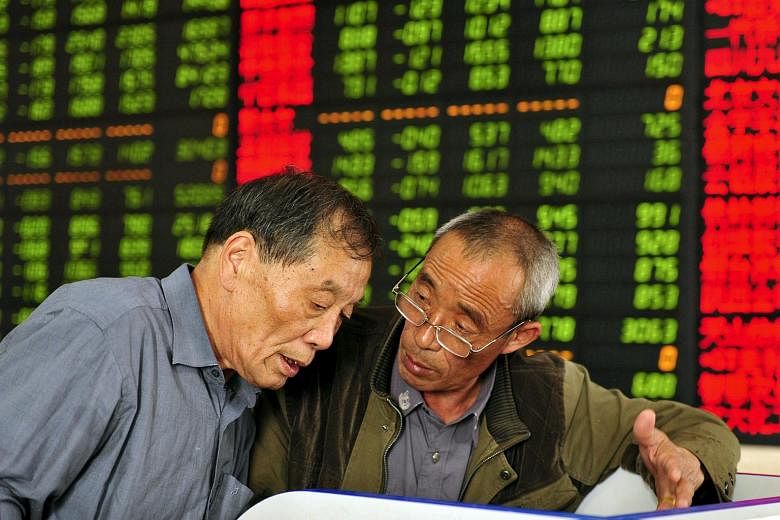HONG KONG (BLOOMBERG) - China's plan to lift a five-month freeze on initial public offerings by the end of the year removes one of its key measures of support for the stock market as equities recover from a US$5 trillion rout.
New share offerings will restart after improvements to the listing system, Deng Ge, a China Securities Regulatory Commission spokesman, said at a briefing in Beijing on Friday (Nov 6). Chinese equity-index futures dropped 0.9 per cent at the close on Saturday in Singapore amid concern that new offerings will divert funds from existing equities.
The resumption suggests authorities are becoming more confident the stock market can stand on its own after the Shanghai Composite Index rallied back into a bull market last week. The move will also help Chinese companies tap into an important source of financing as they seek to cut debt levels from near record highs.
"There will be short-term damage to sentiment in the market," said Ronald Wan, Hong Kong-based chief executive officer at Partners Capital International. "But the government has to proceed with market reform and the timing for IPOs will be better now than next year as the market seems to have some strength."
The rally in China follows an unprecedented state campaign to prop up share prices, along with increased monetary stimulus to combat an economic slowdown. The official support has helped revive confidence among local investors, spurring a pick-up in trading activity and sending the Shanghai Composite to its highest close in 11 weeks on Friday before the CSRC announcement.
Unlike in most major stock markets, Chinese regulators control the timing and pricing of new listings. While policy makers have pledged to loosen their grip on the process, almost all of this year's deals have been priced at levels below 23 times earnings. The valuation cap has led to nearly guaranteed gains once new shares start trading, spurring investors to place bids worth hundreds of billions of dollars during each round of new listings.
Ten of the 28 companies that were in the process of listing when the freeze began will restart the process after Nov 20, said another CSRC official at the same briefing, who asked not to be identified because of agency rules. It will take two weeks for the 10 to complete the process, while the remaining 18 will sell shares by the end of the year, Mr Deng said. Separately, the CSRC suspended Shenwan Hongyuan Group and China Galaxy Securities from opening new investor accounts.
The resumption of IPOs will help the government reinforce the idea that the stock market has recovered from its rout, according to Robbert van Batenburg, director of market strategy at Societe Generale.
"It's a bit of make-believe effort for China to give an impression that we are in a more normalized situation after what happened in August," Batenburg said in New York. "It definitely creates an illusion that at the government is more confident that the market is going to absorb these IPOs. But I don't know how it's going to evolve after that. The headwinds are not out of the way yet."
While the Shanghai Composite has rallied 23 per cent from its August low, foreign investors don't appear to be convinced about the rebound: they've been selling mainland equities through the Shanghai-Hong Kong exchange link for four straight weeks, cutting holdings by the most in two months on Thursday. Third-quarter profits trailed analyst estimates at 68 per cent of companies in the index, the eighth straight quarter of disappointing results, while data over the weekend showed exports fell more than expected in the October.
"It will be interesting to see what sort of valuation levels are achievable for the new IPOs and what, if any, foreign participation there is," said Tony Hann, head of equities at Blackfriars Asset Management Ltd. in London.
Before the stock market started tumbling in June, Chinese authorities had endorsed the use of equity financing as an alternative to debt, which becomes more difficult for many companies to repay as economic growth slows. The aggregate debt-to-equity ratio for companies in the Shanghai Composite rose to the highest level since 2005 in January, while the McKinsey Global Institute estimates corporate liabilities reached 125 per cent of gross domestic product in 2014.
"IPOs have to be resumed given that the stock market should be functioning for companies to raise capital and that should help the economy," Wenjie Lu, a Shanghai-based strategist at UBS.

